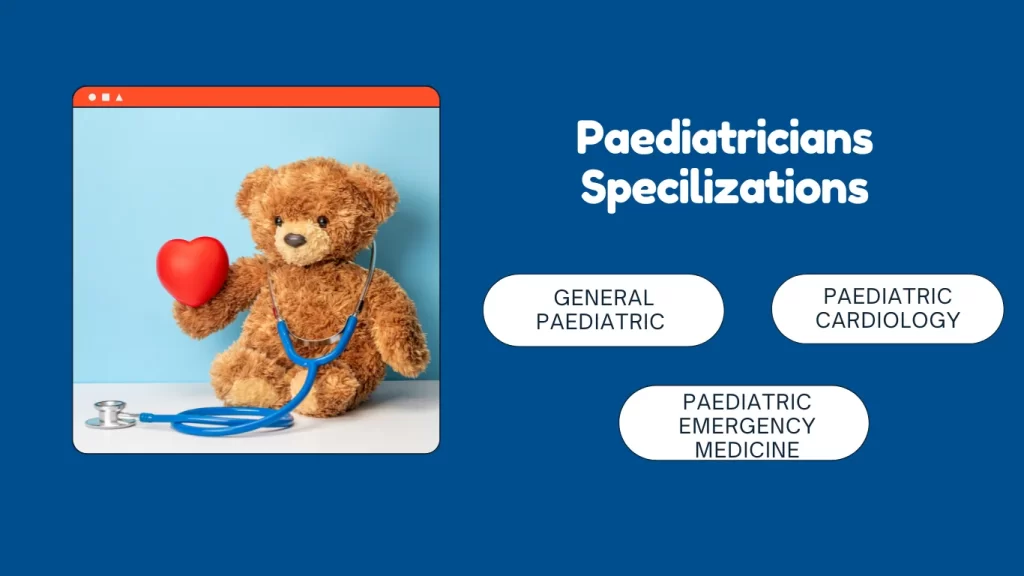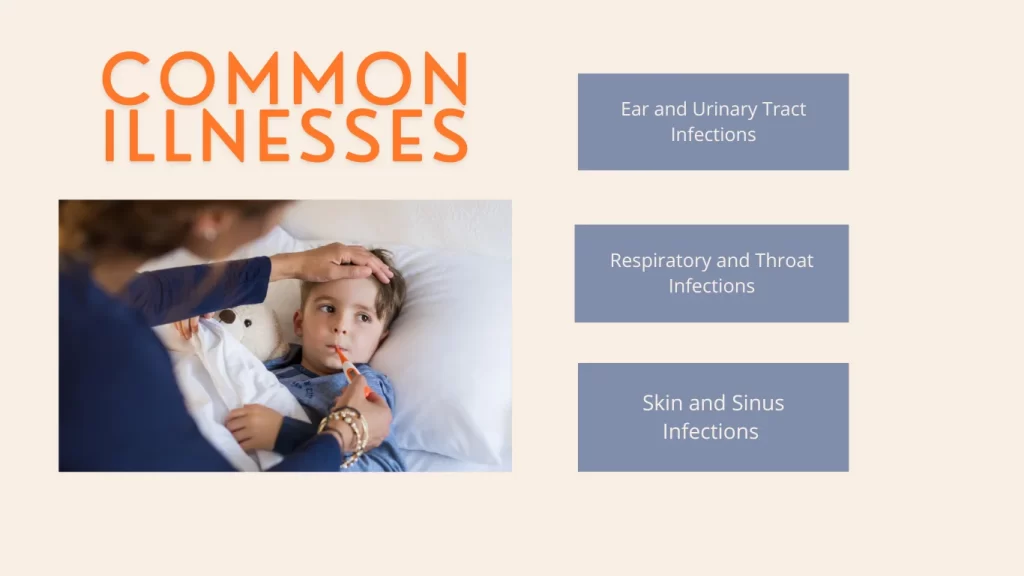The journey of your child’s health can be complex and often nerve-wracking. A paediatric GP meaning pediatrician is a medical professional specializing in pediatric care. These child specialists embody the front line of defense against childhood illnesses, ensuring developmental milestones are met and providing pediatric medicine when needed. The significance of a paediatrician’s role in our children’s ongoing health and well-being cannot be overstated, encompassing everything from routine check-ups to diagnosing and managing chronic conditions.
We will explore the extensive training and qualifications required to become a paediatrician, including the meaning behind the term and what sets these pediatric doctors apart from other healthcare providers. Our discussion will provide a clear understanding of what is pediatrics, pediatric assessments, pediatrician definition, what does a paediatrician do and the invaluable support these child doctor specialists offer in pediatric health care. Join us as we unpack the critical importance of what do pediatricians do in fostering healthy, happy children.
What is a Pediatrician?
Paediatricians are medical specialists dedicated to the health and well-being of babies, children, and teenagers. They are crucial in diagnosing, treating, and providing comprehensive medical care for the younger population. These specialists address common and complex illnesses and monitor children’s physical, mental, and behavioural development, ensuring a holistic approach to pediatric healthcare.
Specialization Areas
Paediatricians often sub-specialize in various areas of pediatric medicine, including surgery and psychiatry, to cater to children’s specific health needs. Some focus on neonatology, the treatment of newborn babies. In contrast, what pediatricians do can differ; others may specialize in cardiology, dealing with heart problems, or development and behaviour, ensuring a wide range of expertise within the field.
Comprehensive Care Approach
Their expertise encompasses various conditions and illnesses affecting children’s health, welfare, behaviour, and learning. Understanding different illnesses allows paediatricians to provide targeted and effective treatment plans. They are also equipped to manage acute and chronic conditions, offering regular medical and health check-ups, information, advice, and necessary screenings and tests.
Paediatricians are the cornerstone of child health, working closely with families to diagnose various medical conditions and treat infants, children, and adolescents. The role of childrens pediatricians extends beyond treating day-to-day illnesses and minor injuries; they also care for children with infectious diseases and specialize in various health-related areas to children, including development, behaviour, hormones (endocrinology), and heart conditions (cardiology). By providing comprehensive care and support, paediatricians are integral in helping children thrive, regardless of their health or developmental concerns.
Training and Qualifications
Duration of Training
Becoming a paediatrician starts with Basic Training in Paediatrics & Child Health, which forms the foundation of a minimum 6-year training program. This initial stage requires three years of full-time equivalent training. Following this, candidates may advance to specialized training programs that differ in duration depending on the chosen subspecialty.
Specializations

Paediatricians can specialize in various areas, such as general paediatrics, paediatric cardiology, or paediatric emergency medicine. Each specialization requires additional training under supervision to prepare for independent practice as a consultant. Subspecialties include Adolescent Medicine, Child Abuse Pediatrics, Developmental and Behavioral Pediatrics, and many more, each focusing on specific aspects of child health.
Certifications
Upon completing basic and advanced training, paediatricians must apply for a Fellowship of the Royal Australasian College of Physicians (FRACP). This certification is crucial as it signifies that the individual has met all professional training requirements and is competent to practice independently. Additionally, all RACP Fellows must meet the requirements of a Continuing Professional Development program annually to maintain their certification.
Conditions Treated by Paediatricians

- Respiratory and Throat Infections: Sore throats often afflict children, with streptococcal infections requiring antibiotics confirmed by a rapid strep test. Common colds, however, do not necessitate antibiotics as they are viral.
- Ear and Urinary Tract Infections: Ear infections may need antibiotics like Amoxicillin unless there’s a penicillin allergy. Urinary tract infections (UTIs) present with symptoms like pain during urination and may require further testing to confirm the best treatment.
- Skin and Sinus Infections: Skin infections might need a culture to identify appropriate treatments, especially if resistant bacteria like MRSA are suspected. Sinusitis, lasting over ten days without improvement, might be treated with antibiotics.
Chronic Conditions
- Long-term Management Needs: Chronic conditions such as asthma, diabetes, and allergies require ongoing management to prevent complications.
- Psychological and Social Impact: These conditions can significantly affect a child’s development and the family’s psychological health, necessitating integrated care approaches such as therapy services and the like.
- Health Disparities: Socioeconomic factors can influence the prevalence and management of chronic conditions, highlighting the need for equitable healthcare access.
Developmental Disorders
- Autism and ADHD: Developmental pediatricians handle conditions like Autism and ADHD, which affect social skills and learning.
- Behavioural Issues: Up to 10% of children under 12 may develop difficulties requiring specialized interventions.
- Learning and Development Delays: Early intervention is crucial for children with developmental delays to improve long-term outcomes.
These conditions illustrate the broad spectrum of what do pediatricians do, emphasizing the importance of specialized care and early intervention in pediatric health.

Referrals
Your journey to a paediatrician child doctor often starts with a referral from your General Practitioner (GP). If your GP believes your child requires specialized care for their health, growth, and development, they will recommend seeing a paediatrician. This could be for a range of conditions such as asthma, allergies, ADHD, autism, behavioural challenges, epilepsy, developmental delays, and more. It’s essential to have a detailed discussion with your GP about why your child needs to see a paediatrician and understand the process, including making appointments and managing waiting times.
Signs to Look For
Identifying the right time to consult a paediatrician is crucial. Common signs include persistent health issues that your GP recommends for specialist assessment, such as recurring ear infections, urinary tract infections, or more complex conditions like muscle or bone problems and sleep disorders. Additionally, if your child shows signs of developmental disorders like ADHD or autism, a paediatrician’s evaluation is necessary. Your GP can guide you on these signs and help you decide the best action.
Emergency Situations
In emergencies, immediate medical attention is required. While your GP can manage most childhood illnesses, complex health conditions might necessitate specialist care from a paediatrician. If the matter is urgent, it’s essential to seek care promptly. However, be prepared for potential waiting times for non-urgent appointments. Always communicate openly with your GP, who can provide interim advice and possibly expedite the referral process in critical cases. Remember, starting with your GP is always a good step. They can help navigate your child’s health concerns and ensure you see the right paediatric specialist when necessary.
Conclusion – Paediatric Gp
Throughout this article, we’ve reviewed the critical importance of paediatric or pediatric GPs in child healthcare, exploring their extensive training and the broad spectrum of conditions they treat. We reviewed what’s a paediatrician, what the job entails and the journey from understanding when to consult a paediatrician to recognizing the signs that signal the need for specialist care emphasizes these professionals’ integral role in ensuring our children’s health and well-being. As we conclude, paediatricians serve as an essential bridge between the primary healthcare provided by GPs and the specialized medical care required for various pediatric conditions.
What does a Pediatrician do (Gp)?
A general practitioner (GP) in paediatrics assists in several ways, including diagnosing and treating common illnesses, administering vaccinations and screening tests, and referring patients to specialist doctors for advanced care.
How does a GP differ from a paediatrician?
While both are essential for child health care, a paediatrician specializes in managing complex health conditions in children. Conversely, a GP deals with general health concerns and routine check-ups.
Why is a pediatric clinic significant?
A pediatric clinic plays a crucial role in enhancing the quality of life for children by managing pain, improving mobility and function, addressing emotional and social needs, and helping children maintain independence and autonomy.
What is the Pediatrician main responsibilities?
Pediatricians are responsible for preventing, detecting, and managing various health issues in children, including physical, behavioural, and developmental problems. While some pediatricians are generalists, others specialize in specific areas of child health.
How often should children visit the pediatrician?
The general recommendations for visits to a pediatrician are the first few months: one, two, four, six, nine, 12, 15, and 18 months, skipping to two years, two and a half years, and three years.





